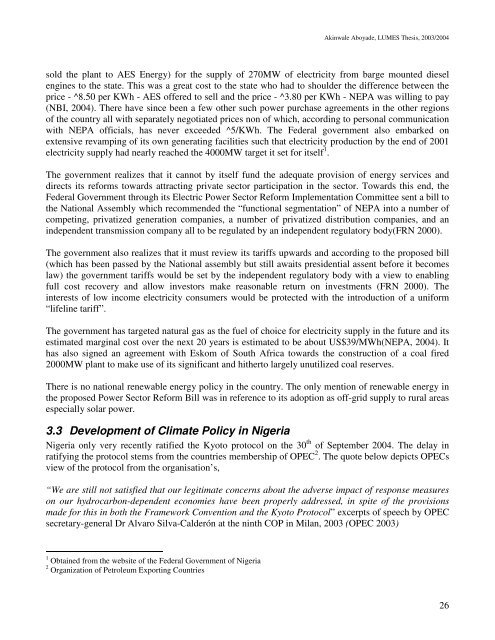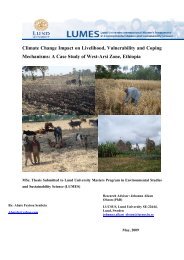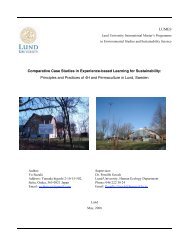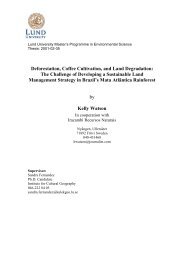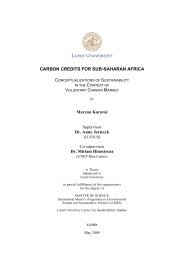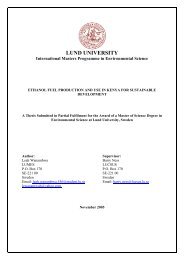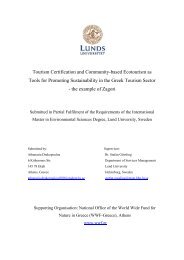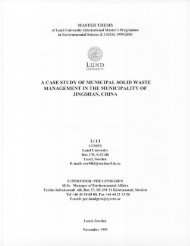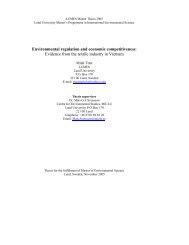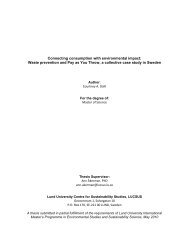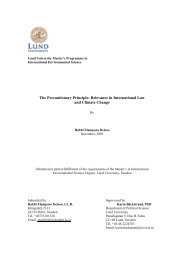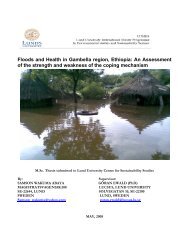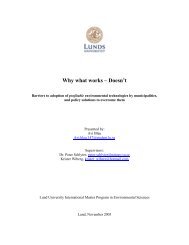Wale Aboyade's thesis - lumes
Wale Aboyade's thesis - lumes
Wale Aboyade's thesis - lumes
Create successful ePaper yourself
Turn your PDF publications into a flip-book with our unique Google optimized e-Paper software.
Akinwale Aboyade, LUMES Thesis, 2003/2004<br />
sold the plant to AES Energy) for the supply of 270MW of electricity from barge mounted diesel<br />
engines to the state. This was a great cost to the state who had to shoulder the difference between the<br />
price - ^8.50 per KWh - AES offered to sell and the price - ^3.80 per KWh - NEPA was willing to pay<br />
(NBI, 2004). There have since been a few other such power purchase agreements in the other regions<br />
of the country all with separately negotiated prices non of which, according to personal communication<br />
with NEPA officials, has never exceeded ^5/KWh. The Federal government also embarked on<br />
extensive revamping of its own generating facilities such that electricity production by the end of 2001<br />
electricity supply had nearly reached the 4000MW target it set for itself 1 .<br />
The government realizes that it cannot by itself fund the adequate provision of energy services and<br />
directs its reforms towards attracting private sector participation in the sector. Towards this end, the<br />
Federal Government through its Electric Power Sector Reform Implementation Committee sent a bill to<br />
the National Assembly which recommended the “functional segmentation” of NEPA into a number of<br />
competing, privatized generation companies, a number of privatized distribution companies, and an<br />
independent transmission company all to be regulated by an independent regulatory body(FRN 2000).<br />
The government also realizes that it must review its tariffs upwards and according to the proposed bill<br />
(which has been passed by the National assembly but still awaits presidential assent before it becomes<br />
law) the government tariffs would be set by the independent regulatory body with a view to enabling<br />
full cost recovery and allow investors make reasonable return on investments (FRN 2000). The<br />
interests of low income electricity consumers would be protected with the introduction of a uniform<br />
“lifeline tariff”.<br />
The government has targeted natural gas as the fuel of choice for electricity supply in the future and its<br />
estimated marginal cost over the next 20 years is estimated to be about US$39/MWh(NEPA, 2004). It<br />
has also signed an agreement with Eskom of South Africa towards the construction of a coal fired<br />
2000MW plant to make use of its significant and hitherto largely unutilized coal reserves.<br />
There is no national renewable energy policy in the country. The only mention of renewable energy in<br />
the proposed Power Sector Reform Bill was in reference to its adoption as off-grid supply to rural areas<br />
especially solar power.<br />
3.3 Development of Climate Policy in Nigeria<br />
Nigeria only very recently ratified the Kyoto protocol on the 30 th of September 2004. The delay in<br />
ratifying the protocol stems from the countries membership of OPEC 2 . The quote below depicts OPECs<br />
view of the protocol from the organisation’s,<br />
“We are still not satisfied that our legitimate concerns about the adverse impact of response measures<br />
on our hydrocarbon-dependent economies have been properly addressed, in spite of the provisions<br />
made for this in both the Framework Convention and the Kyoto Protocol” excerpts of speech by OPEC<br />
secretary-general Dr Alvaro Silva-Calderón at the ninth COP in Milan, 2003 (OPEC 2003)<br />
1 Obtained from the website of the Federal Government of Nigeria<br />
2 Organization of Petroleum Exporting Countries<br />
26


